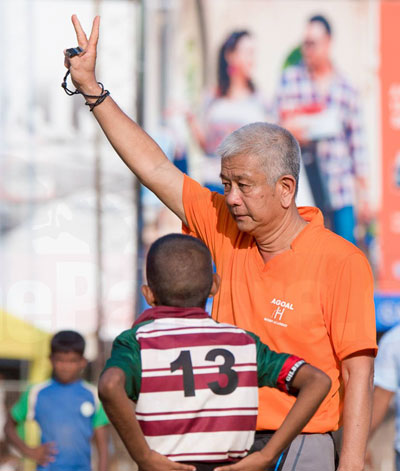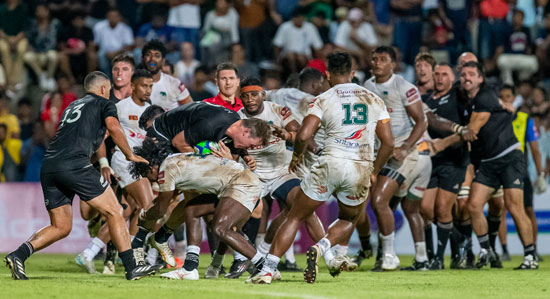One Island, Many excuses: Sri Lanka’s rugby dream stumbles again

S.W. Chang still remains active in local rugby
If Sri Lanka Rugby is to pursue glory like Japan, a structured plan backed by a comprehensive national policy under one umbrella must be adopted, according to Shen Woei Chang—former Trinity College and Havelocks forward, and later a respected referee and commentator. Chang’s observations follow the setback suffered by the Sri Lanka Men’s 15s team at the recently concluded Asia Rugby Emirates Men’s Championship 2025, where the islanders bowed out after three successive defeats, relegating them to yet another repechage.
With that, Sri Lanka’s closest opportunity to qualify for a Rugby World Cup (RWC)—the 2027 edition—came to an end. Hong Kong China remained unbeaten to secure direct qualification, while the United Arab Emirates (UAE) earned the right to face the runners-up of the African Qualifiers in a repechage, with the winner guaranteed a place in the RWC Final Qualification Tournament.
“Every time Sri Lanka steps in, we hear the same tired excuse: ‘not enough time for preparation’. That negative mindset is where the problem begins. We already know well in advance where, when, and against whom we are playing. For a mission of such importance, we must be better prepared,” Chang said, referring to the ad-hoc ‘pick-and-go’ strategy often followed by national team selectors and administrators.
Sri Lanka’s 15s success in 2024, when they won the Asia Rugby Division I Championship with an unbeaten record, had raised hopes of the island
reaching a historic milestone. In its proud history of nearly 120 years, Sri Lanka stood on the brink of its first-ever RWC appearance—a chance fraught with challenge but rich in promise.
But following a turbulent campaign, that repechage slot now belongs to the UAE, who will face the African runners-up in a bid for a place in the Final Qualification Tournament—an opportunity that
Sri Lanka appeared neither ready for nor particularly interested in.
Qualifying for a RWC might seem like an impossible task for the second oldest Rugby Union in Asia, second only to Japan—who have already proven otherwise. With Japan securing a direct RWC berth, Asia had a second spot—taken by Hong Kong China—and a third, offered through a long route of inter-continental playoffs among regional second seeds.
Having squandered all their opportunities, Sri Lanka must now pin its hopes on the 2031 RWC Qualifiers. But until then, the more pertinent question is: how should Sri Lanka plan ahead?
“There are ‘probables’ and ‘possibles’ pools that can be maintained year-round for the national squad. Most local players are under contract with clubs, and this reality must be accommodated,” Chang explained.
“In the current setup—which has sadly been the case for decades—many players choose club commitments over country. That needs to change. Players must feel secure in their clubs and confident when called up to represent the nation. That’s a shackle I’ve long hoped to see broken,” said Chang, one of the senior-most figures in Sri Lankan rugby.
After a hiatus since their Asian Rugby Championship Division I game against Chinese Taipei on 1 June 2019 (a 72–17 win), Sri Lanka’s return to 15s rugby on 30 April 2024 was remarkable. Playing India at the Racecourse Grounds in Colombo, Sri Lanka secured a convincing 45–10 win. A week later, on 4 May, they routed Kazakhstan 45–7 at the same venue, earning the right to play Malaysia in the Asia Rugby Men’s Championship Qualifier.
Despite the absence of a consolidated national policy and ongoing internal conflicts within Sri Lanka Rugby (SLR), the country’s vibrant domestic competitions kept top players match-ready. That momentum, combined with support from a focused coaching staff, helped Sri Lanka overpower Malaysia 59–19 on 19 April to secure promotion to the Asian Top Division after 14 years.
To further its RWC 2027 campaign, Sri Lanka also hosted the world’s first-ever Under-85kg International Series against New Zealand in May. Although they lost both matches—10–50 at Nittawela on 4 May, and 6–32 at Racecourse on 10 May—the series offered crucial international exposure ahead of the Asia Rugby Emirates Men’s Championship 2025.
Just as things seemed to be progressing smoothly, a public outburst from a senior official criticising the coach and support staff led to the resignation of Head Coach Sanath Martis, appointed in 2024. His exit, just weeks before the crucial matches against South Korea, Hong Kong China, and the UAE, threw the campaign into disarray. New Zealander Rodney Gibbs, a specialist in Sevens rugby, was brought in as a replacement—only to endure three successive defeats that shattered Sri Lanka’s 2027 RWC aspirations.
Against South Korea and the UAE, Sri Lanka could blame only themselves for letting victory slip away. South Korea edged them out 38–34, while UAE triumphed 29–21—both matches held in Colombo. The away fixture against Hong Kong China was a disaster, with Sri Lanka thrashed 78–7, leaving them staring at a return to Division I in 2026 unless they win the repechage.
“We performed well overall. But one of Sri Lanka’s long-standing issues is scrummaging—our school rugby follows Under-19 laws, and the jump from school to club rugby is massive,” Chang observed.
“If we can’t apply Under-20 laws at schools, we must organise a bridging tournament. Without that, we risk a serious gap in player development. But, as I’ve always said, there’s a solution to every problem. It’s a matter of willingness.”
Despite all the potential to join Japan and Hong Kong on the global stage, Sri Lanka remains stuck within Asia, swinging between the top and lower tiers. Structurally, Sri Lanka should be maintaining at least seven national units: the Men’s 15s (Tuskers), the Women’s 15s, the Men’s and Women’s Sevens, as well as the Sri Lanka ‘A’, Under-23, Under-20, Under-19 and Schoolboys squads. But teams are usually assembled only when the need arises, with larger pools hastily trimmed into final squads.
Had SLR enforced its intended national policy of maintaining those extended squads, managing players would have been a far smoother process.
Following the Asia Rugby Emirates Men’s Championship 2025, global rankings saw significant changes. Hong Kong China climbed to 22nd, South Korea dropped to 36th, and the UAE surged from 50th to 40th in just three weeks. Sri Lanka, however, plummeted from 39th to 46th, leaving fans and officials alike scrambling for answers. According to rugby veterans, players and coaches have little influence when the administrative framework is fractured.

“How can players perform miracles in a matter of weeks?” questioned former national player Hisham Abdeen.
“Yes, back in our day we somehow managed, but today things have changed. While our administrators continue fighting among themselves, rugby elsewhere—including in Asia—has become a fully professional sport. If Sri Lanka is to reach the global stage, whether in 15s or Sevens, the only solution is a comprehensive and long-term national plan, supported by partnerships with established rugby nations,” he added.
Some followers now suggest Sri Lanka Rugby should scout foreign-based professionals of Sri Lankan heritage—a strategy that worked well for the national men’s football team. However, the success of cricket in Sri Lanka tells a different story: nothing beats a well-structured national programme backed by consistent administration.
“Rugby in Sri Lanka is fragmented. It must come under one umbrella—a national policy where players from clubs and schools fall under the jurisdiction of a single body, namely SLR,” Chang emphasised.
“Another issue is the need for ministerial approval, even when National Association selection committees are already appointed under the Minister’s authority. These seemingly minor issues, along with the attitudes of all stakeholders, must change,” he concluded.


